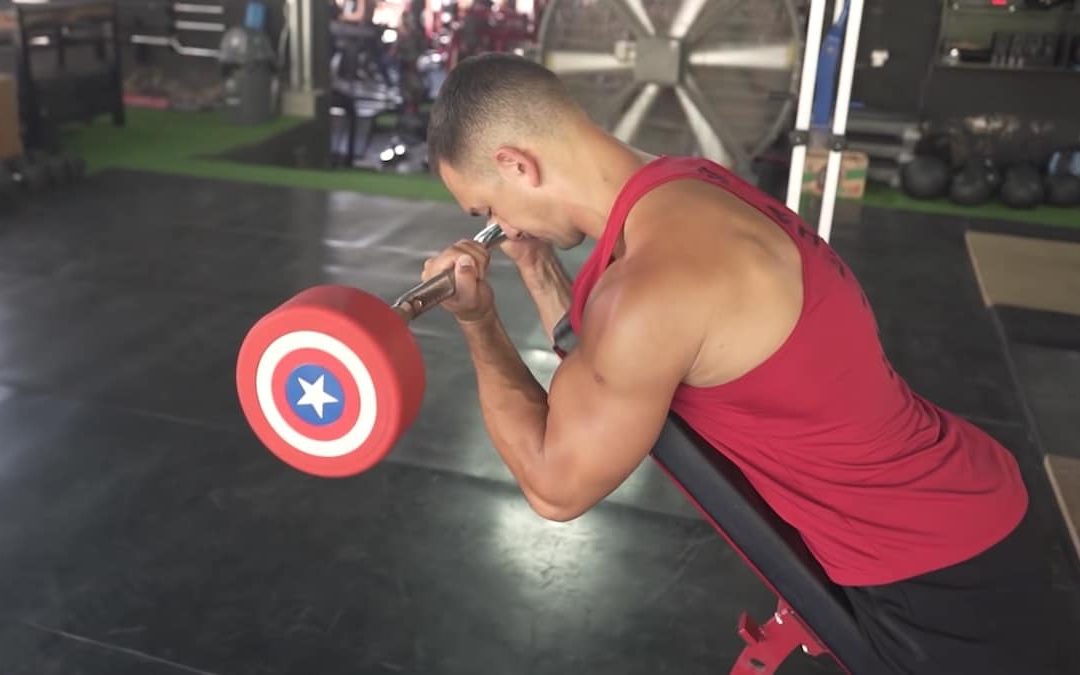Big basic exercises like the bench press, pull-up, and barbell row are great for building your back, chest, and even shoulders, but they might not suffice to fill your sleeves and build an impressive set of guns.
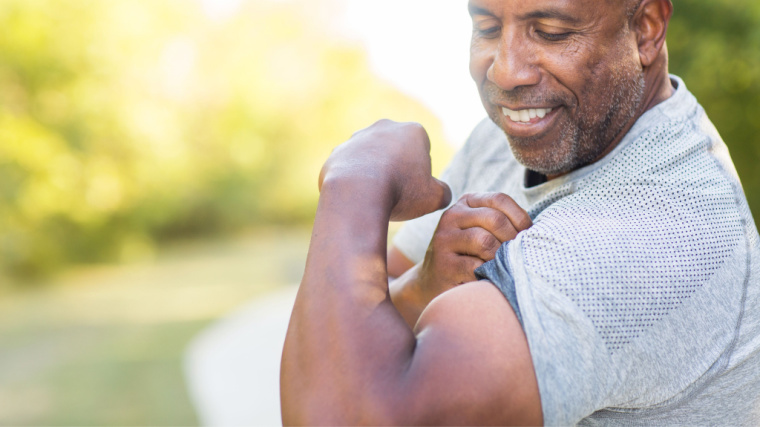
Training your biceps directly will not only contribute to specific muscle growth, but also joint health and performance. Traditional exercises like the barbell curl can usually target your biceps just fine, but if you want to take things to the next level and really focus on your upper arms, consider including the spider curl in your training regimen. (1)
Among the many curl variations that exist, the spider curl takes advantage of gravity, leverage, and arm position to emphasize the short head of the biceps and provide a unique stimulus, leading to more growth and bigger arms. (2) Here’s why and how you should use this special exercise.
- How to Do the Spider Curl
- Spider Curl Mistakes to Avoid
- How to Progress the Spider Curl
- Benefits of the Spider Curl
- Muscles Worked by Spider Curl
- How to Program the Spider Curl
- Spider Curl Variations
- Frequently Asked Questions
How to Do the Spider Curl
The spider curl, sometimes called the reverse incline curl, gets its more visual name because the position in which you perform the exercise resembles the arachnid dangling from its thread. Indeed, the weight will be dangling from your arms, and you’ll use gravity and positioning to provide a unique biceps stimulus.
Step 1 — Set Your Bench and Get Into Position
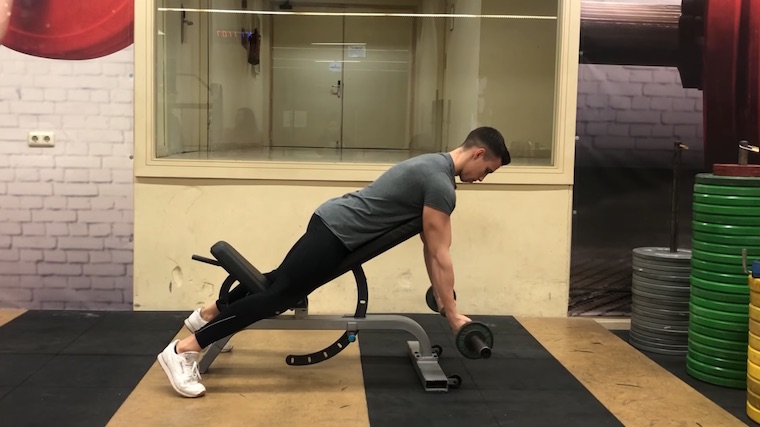
Set an adjustable bench at approximately 45-degrees, similar to an incline bench press. Grab a barbell with a palms-up grip and lie chest-down on the bench. Have your head and neck protrude over the top of bench and let your arms hang straight toward the ground.
Retract and depress your scapulae (pull your shoulder blades together and down) and maintain this position for the duration of the lift.
Form tip: Find a secure foot position so that you’re comfortable and stable on the bench, allowing you to fully focus on working your arms. This will depend slightly on your height, leg and torso length, and individual bench model. You may feel more balanced with a relatively wide stance or with your feet close together.
Step 2 — Curl the Weight Up
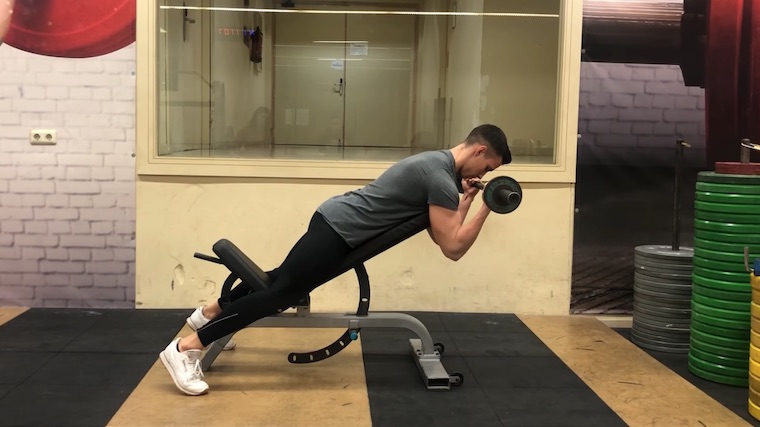
Keep your upper arms vertical as you curl the weight up as far as possible without moving at your shoulder. In the top position, squeeze your biceps as hard as you can for a second. Keep your elbows pointing toward the ground the whole time.
Keep your wrists straight or bent slightly backward to maintain maximum tension on your biceps and prevent your forearms from taking over the workload.
Form tip: If your elbow shifts forward, you’ll reduce tension from the biceps by using assistance from your front deltoids (shoulders). You’ll also diminish the effective range of motion. The mechanics of the exercise already make it a relatively short motion, as there is limited tension at the bottom of the movement. If you start moving your elbows, you will lose even more tension at the top.
Step 3 — Lower With Control
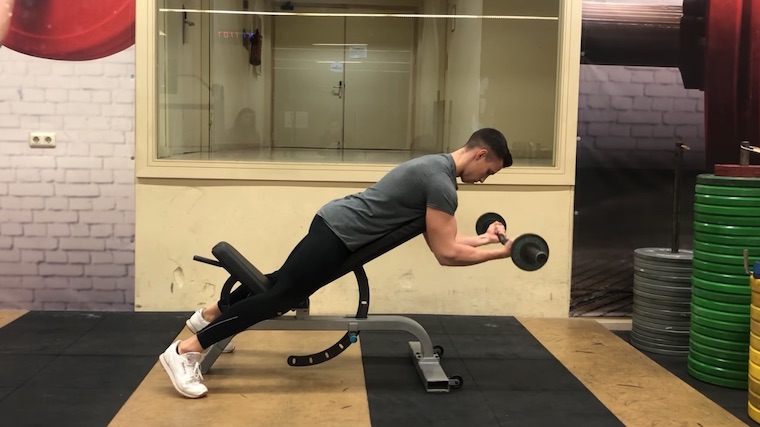
Slowly let the weight come down to the initial position. Controlling the eccentric (lowering) portion of the movement will prevent you from bouncing or cheating, which would make the exercise less effective.
By moving with control, you’re keeping tension on the desired muscle, leading to better results. Repeat for the desired amount of repetitions to complete a set.
Form tip: If your wrists or elbows are prone to tendonitis or pain, consider using an EZ-curl bar, as the slightly angled grip can be easier on the joints.
Spider Curl Mistakes to Avoid
Biceps exercises are often butchered for the sake of ego, leading to suboptimal results. Isolation exercises are technically easier than more complex multi-joint exercises, but that doesn’t mean you can just wing it carelessly. Avoid these common blunders if you want the biggest arms possible.
Going Too Heavy
There are big compound (multi-joints) exercises recruiting several muscle groups to move heavy weights. Then there are isolation (single-joint) exercises which focus on a single muscle group, typically with moderate weights to maintain targeted tension. Then, there are hyper-specific isolation exercises that focus on a particular “part” of a muscle group.
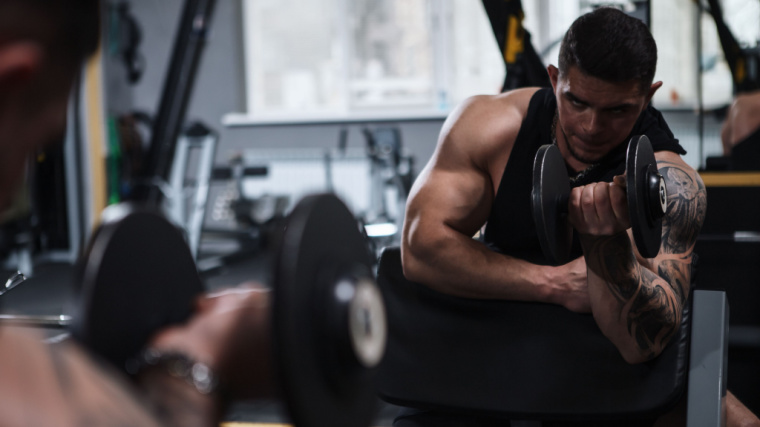
These laser-precision exercises are really not meant for moving heavy weight, but are instead best used to bring up a very specific muscle part or emphasize a particular head of a muscle. The spider curl is one of these detail-oriented exercises, as it focuses on the short head of the biceps.
Using heavy weights will defeat the purpose of the exercise because you will undoubtedly shift the workload to other body parts and encourage cheating.
Avoid it: Keep the weights relatively lighter and the sets relatively longer with more reps and a greater focus on squeezing your biceps. If you feel strong contractions someplace other than your biceps, consider using a lighter load.
Using Momentum
Because of your arms’ position relative to gravity, there’s very little tension on the biceps in the bottom portion of the lift. The effective range of motion is already relatively short, primarily the upper half to three-quarters of the curl. If you reduce the range even further by swinging the weight, you lose a lot of time under tension and skip one of the key elements to muscle growth. (3)
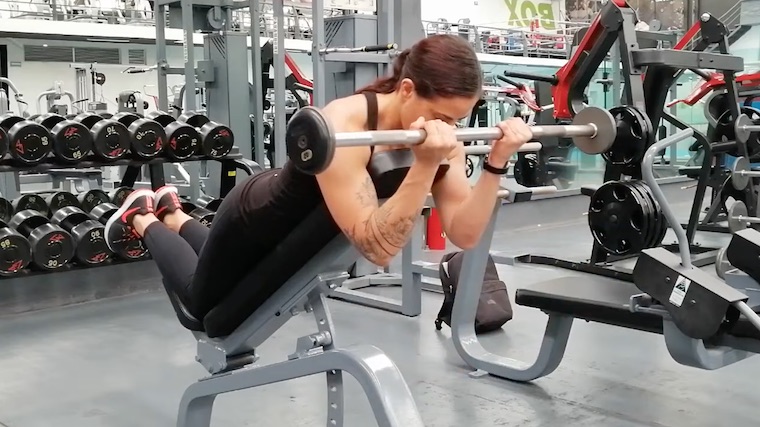
Moreover, if you swing your arms around to use more weight, you exceed your biceps muscular strength. This means that the additional pounds being lifted are stressing your connective tissues and joints more than your muscles, and you risk injuries just for the sake of ego.
Avoid it: Practice using a controlled tempo and, if necessary, an especially slower lowering speed. If you can’t perform the desired amount of repetitions without resorting to momentum, reduce the weight.
How to Progress the Spider Curl
The fact that your arms are hanging in the air during the spider curl might prove difficult for inexperienced lifters to coordinate at first. On the other hand, some hardcore gym-goers will crave a more difficult challenge for building their arms. Try these progressions exercises if you belong in either category.
Preacher Curl
The preacher bench is specifically designed for isolated biceps training. It mimics the spider curl mechanics by setting your arm at an angle and it focuses on the short head as well, but offer the advantage of a secured and supported position from the bench pad.
With this equipment, there’s not much cheating possible. Use it to train with perfect your form and build a mind-muscle connection before trying the spider curl. Start with the more commonly used 45-degree pad and progress to using the vertical pad, just like the unsupported spider curl.
Spider Concentration Curl
If you’ve already mastered the barbell spider curl, you can try this upgraded dumbbell progression, also called incline concentration curl. For a nasty biceps pump, perform it like a standard two-dumbbell spider curl, but press the pinky-side plates of the dumbbells together and squeeze them as hard as you can the whole duration of the lift.
The short head of the biceps also contributes to bringing the arms together, so the isometric adduction (inward movement) will recruit this part of your biceps even further.
Spider Curl Benefits
You can count on arm-obsessed lifters to invent a myriad of biceps exercises, but they aren’t the product of vanity — each has distinct goals and benefits. The spider curl is specifically designed for aesthetic purposes with a laser-like precision, but that doesn’t mean only those with physique goals should include this movement.
Pure Biceps Training
The unique shoulder and arm position induced by this exercise is highly effective for developing a mind-muscle connection and isolating the biceps for hypertrophy. (4) If you recruit other muscles, your arms will start to sway and the mechanics will change. Also, you cannot cheat by swinging your body as much as with some other biceps exercises.
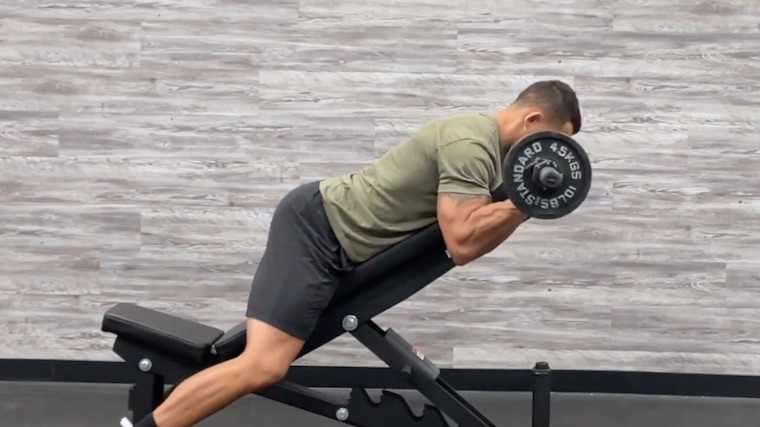
If you have lagging upper arms, this is a great way for you to accumulate quality volume without recruiting or fatiguing other muscle groups. (5) Isolation exercises are excellent for developing symmetry and an aesthetic physique.
Focuses on the Short Head of the Biceps
If you feel you’re lacking in the inner part of your biceps, give this exercise a go. Focusing on the short head of the biceps will increase the “width” of your arm and give the appearance of a fuller-looking muscle.
The spider curl will target this head more because of the arm’s position, in front of the shoulders. The short head of the biceps attaches at the front of your shoulder joint and can perform a stronger contraction when your shoulder is “relaxed” in the stretched position.
Joint Health and Strength
This exercise can be beneficial for athletes competing in strength sports, such as powerlifting or strongman/strongwoman by directly contributing to overall pulling strength. It may also help with elbow and shoulder joint health by reducing repetitive use strain from performing a limited number of biceps exercises.
Switching to the spider curl will provide variety and a different stimulus, resulting in less stress on your joints and efficient training with lower overall weight used. This can have restorative benefits, especially when performed for higher reps.
Muscles Worked by the Spider Curl
The spider curl has one primary goal: to increase your arm size. Let’s see how it contributes to this sought-after goal.
Biceps Brachii
The biceps is the biggest and most visible anterior arm muscle. It flexes the arm, supinates the wrist (rotates the palm upwards), and slightly contributes to various shoulder movements and stability.
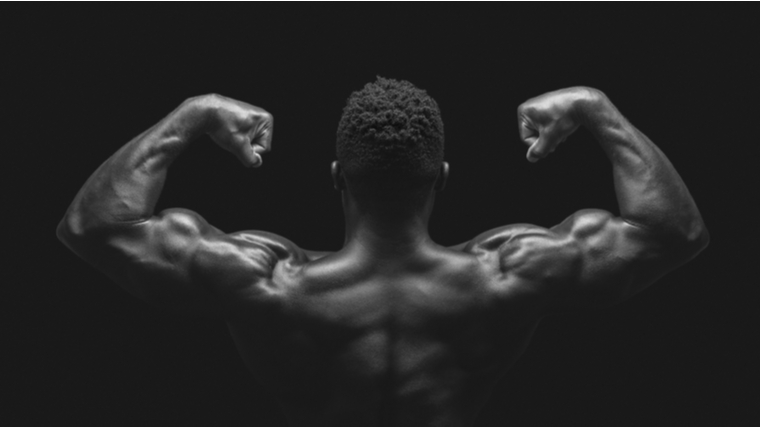
This muscle is composed of two heads, both attached to the radius (forearm bone). The long head runs on the outer side of the arms and is attached to the shoulder blade. The short head is on the inner side of your arm and also attaches to the shoulder blade, but directly from the front of the shoulder.
The spider curl emphasizes the short head because of the hanging arm position. The long head is in a “shortened” position and its involvement is limited in the stretched position.
Brachialis
This deeper muscle is located under the biceps brachii. It is the primary elbow flexor, being significantly stronger than the biceps itself and not involved in supinating or rotating your wrists. As such, it is recruited during any curl exercise. Increasing its size will result in a fuller arm and will also “push” your biceps upwards, making it appear even bigger.
Forearms
Several forearm muscles contribute to elbow flexion, notably the strongest of them — the brachioradialis. The spider curl will also make your forearms bigger, which can visually help to make up for a genetically “shorter” biceps with long tendons near the elbow. Training these muscles can also improve your elbow and wrist health and performance.
How to Program the Spider Curl
This exercise is not suited to heavy weights, so programming is quite straightforward. Get the most out of the spider curl using these repetition schemes.
Moderate Weight, Moderate Repetitions
This time-tested approach will yield a ton of results. It has been bodybuilders’ favorite for decades for a reason. Do three to four sets of eight to 12 repetitions for maximal muscle gains. This will provide training volume in the most effective hypertrophy range, driving muscle growth.
Light Weight, High Repetitions
Studies have shown that as long as you’re using 40% of your one-rep maximum and are taking muscles close to failure, you’ll reap effective muscle gains, so do not be afraid of going lighter sometimes. (6) Two to three sets of 15 to 20 repetitions will provide a great stimulus, and an intense burn, ideal for a finisher while also being easier on the joints.
Spider Curl Variations
Variety is the spice of life, and that also applies to training. If you don’t have a barbell or if you wish to provide your biceps a different training stimulus, try these variations.
Dumbbell Spider Curl
Using a pair of dumbbells instead of a bar can address imbalances between each arm. Because each arm is moving independently, you can’t use your stronger side to compensate for your weaker one.
This is the perfect variation if you have a blatantly weaker side or if you want the most symmetrical physique possible. It will, however, take a but more coordination and concentration to move the weights at the same time.
Cable Spider Curl
The spider curl is a great exercise to target the short head of the biceps, but it’s doing a poor job of training the lengthened position of the muscle because of gravity’s limited effective in the bottom position. Using a cable pulley is the solution.
Set up a bench at a low cable station to provide muscular tension for the duration of the lift. This boosts the muscle’s time under tension and increases the need for a controlled eccentric. You can also feel a greater stretch in your biceps.
Concentration Curl
This old school exercise uses the same general mechanics as the spider curl, with your working arm extended down, but you don’t need an angled bench. Grab a dumbbell and train one arm at a time. Lean forward and curl while being as strict as possible — don’t start swinging your torso.
This is a harder variation as you have to stabilize your body and really concentrate on your biceps. Some lifters claim it emphasizes the alleged biceps “peak,” but it will mostly provide good, focused work while isolate your biceps as much as possible.
FAQs
The spider curl is probably not the first exercise that pops in your mind when you think about biceps training, so that’s fine if you have some questions about this lesser known lift.
When should I do the spider curl in my workout?
Generally speaking, isolation exercises are best done at the end of the session. You want to start with heavy poly-articular (multi-joint) exercises like rows and presses when you’re fresh and can lift the most weight. Use isolation movements to finish your muscles and drive hypertrophy with less neural constraints.
If you’re doing an arms-only session, keep this one at the end. The spider curl is one of the strictest exercises there is, focusing on a specific part of a single muscle group, where you can use the least weight. See it more as a “finisher.”
Will it build the peak of my biceps?
Not specifically. It will improve your biceps as a whole, but if you want to target your biceps “peak” (the part of the biceps the grows vertically and gives a taller appearance to the muscle), you have to target the long head of the biceps and hope your genetic lottery will yield the results you’re after.
The spider curl focuses on the short head, making your arms relatively more impressive from the front because it contributes to “width” more than “peak.” Couple it with an exercise that emphasizes the long head, like the incline dumbbell curl, for complete biceps development.
References
- Wiesinger, H. P., Kösters, A., Müller, E., & Seynnes, O. R. (2015). Effects of Increased Loading on In Vivo Tendon Properties: A Systematic Review. Medicine and science in sports and exercise, 47(9), 1885–1895. https://doi.org/10.1249/MSS.0000000000000603
- Kassiano, Witalo1; Nunes, João Pedro1; Costa, Bruna1; Ribeiro, Alex S.1,2; Schoenfeld, Brad J.3; Cyrino, Edilson S.1. Does Varying Resistance Exercises Promote Superior Muscle Hypertrophy and Strength Gains? A Systematic Review. Journal of Strength and Conditioning Research: June 2022 – Volume 36 – Issue 6 – p 1753-1762 doi: 10.1519/JSC.0000000000004258
- Burd NA, Andrews RJ, West DW, Little JP, Cochran AJ, Hector AJ, Cashaback JG, Gibala MJ, Potvin JR, Baker SK, Phillips SM. Muscle time under tension during resistance exercise stimulates differential muscle protein sub-fractional synthetic responses in men. J Physiol. 2012 Jan 15;590(2):351-62. doi: 10.1113/jphysiol.2011.221200. Epub 2011 Nov 21. PMID: 22106173; PMCID: PMC3285070.
- Calatayud J, Vinstrup J, Jakobsen MD, Sundstrup E, Brandt M, Jay K, Colado JC, Andersen LL. Importance of mind-muscle connection during progressive resistance training. Eur J Appl Physiol. 2016 Mar;116(3):527-33. doi: 10.1007/s00421-015-3305-7. Epub 2015 Dec 23. PMID: 26700744.
- Schoenfeld BJ, Contreras B, Krieger J, Grgic J, Delcastillo K, Belliard R, Alto A. Resistance Training Volume Enhances Muscle Hypertrophy but Not Strength in Trained Men. Med Sci Sports Exerc. 2019 Jan;51(1):94-103. doi: 10.1249/MSS.0000000000001764. PMID: 30153194; PMCID: PMC6303131.
- Thiago Lasevicius, Carlos Ugrinowitsch, Brad Jon Schoenfeld, Hamilton Roschel, Lucas Duarte Tavares, Eduardo Oliveira De Souza, Gilberto Laurentino & Valmor Tricoli (2018) Effects of different intensities of resistance training with equated volume load on muscle strength and hypertrophy, European Journal of Sport Science, 18:6, 772-780, DOI: 10.1080/17461391.2018.1450898
Featured Image: Sean Nalewanyj / YouTube

